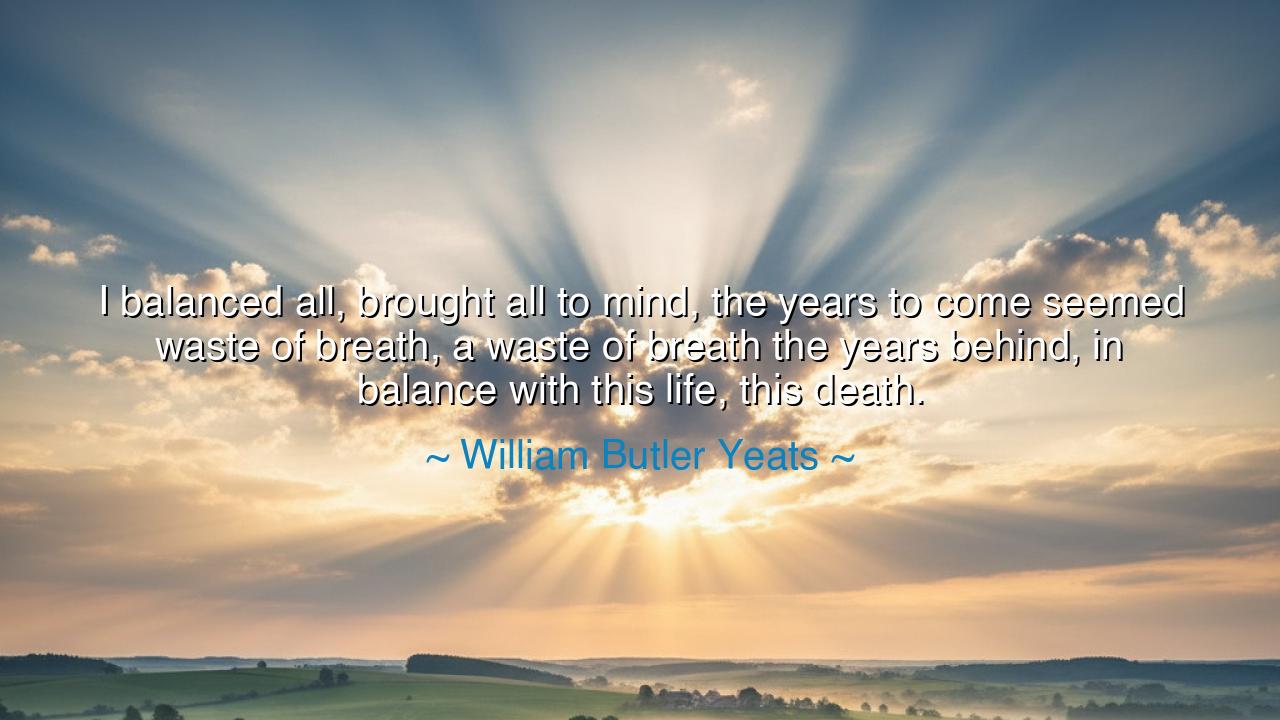
I balanced all, brought all to mind, the years to come seemed
I balanced all, brought all to mind, the years to come seemed waste of breath, a waste of breath the years behind, in balance with this life, this death.






“I balanced all, brought all to mind, the years to come seemed waste of breath, a waste of breath the years behind, in balance with this life, this death.”
Thus spoke William Butler Yeats, the sage-poet of Ireland, in his final years, when the shadow of mortality had fallen long upon his path. These lines, drawn from his poem “The Circus Animals’ Desertion,” are not merely the lament of an aging man, but the meditation of a soul standing at the threshold between life and death, weighing the worth of all that has been and all that will be. In these words, Yeats performs the sacred act that awaits every mortal—the reckoning of existence, the balancing of time, meaning, and the mystery of the end.
The origin of this quote lies near the close of Yeats’s life, when his body had grown frail but his mind burned with undiminished fire. He had spent decades seeking truth through art, myth, and mysticism, striving to understand the purpose of life and the eternal dance between creation and decay. In this final reflection, Yeats does not speak as a poet of ambition, but as a philosopher of surrender. He gazes upon the arc of his days—the triumphs of youth, the struggles of middle age, the wisdom of old age—and finds them equal in their fleetingness. Both the past and the future, he says, are “waste of breath” when weighed against the eternal stillness of death. Yet within this apparent despair lies not hopelessness, but peace—the peace that comes when one finally accepts the sacred symmetry of existence.
The phrase “I balanced all” is the key to understanding Yeats’s revelation. To “balance” is not to dismiss life, but to see it whole—to stand apart from longing and regret, and to behold both joy and sorrow as parts of one divine equation. The poet has ceased to measure life by achievement or loss; instead, he measures it by its completeness, by the way all things—love and pain, birth and decay—resolve into harmony. The years to come are as futile to chase as the years behind are to mourn, for both are shadows of the same breath. Yeats teaches us that wisdom begins when the soul ceases to grasp and begins to see.
This idea has echoed through the wisdom of the ages. The ancient Stoic philosopher Marcus Aurelius once wrote, “Consider every moment as your last. The past is dead, the future uncertain; only the present belongs to you.” Like Yeats, he saw that to live truly, one must dwell in the present, where life and death coexist. For the moment you live is also the moment you begin to die—and within that truth lies freedom. So too did the Buddha teach that all striving and desire are chains, and that liberation comes only through acceptance of impermanence. Yeats, though born in another age, joins this timeless choir of sages: his poem is not an elegy for life lost, but a hymn to the eternal balance between being and ending, breath and stillness.
There is a story that mirrors this wisdom. In the twilight of his reign, the Roman general Scipio Africanus, who had conquered Carthage and earned immortal glory, retired to solitude. When asked if he mourned his power and fame, he replied, “I have lived enough to see that glory fades as swiftly as the day’s light. I have learned that victory and defeat taste alike when swallowed by time.” In those words lies the same balance Yeats discovered—that when one’s life is viewed from the height of mortality, the boundaries between success and failure dissolve. What remains is the simple, unshakable truth that all things return to silence, and that this silence is not loss but completion.
Yet Yeats’s vision is not without its passion. The poet does not embrace death with indifference but with awe. “This life, this death”—he names them side by side, as equals, as lovers bound in eternal union. Death, for him, is not the opposite of life, but its reflection, its fulfillment. To deny death is to deny half of what it means to live. In acknowledging both, Yeats finds transcendence. He becomes like the aged oak that, though stripped of leaves, still stands tall, whispering its wisdom to the wind: that beauty lies not in resistance, but in surrender; not in clinging, but in becoming part of the whole.
And so, my friends, what lesson shall we take from the poet’s final reckoning? It is this: live fully, but without grasping. Do not waste your breath on the regrets of yesterday or the fears of tomorrow. Instead, live each moment with awareness, knowing that every joy and every sorrow is a step in the grand balance. When you face hardship, remember that even suffering has its place in the harmony of existence. When you taste delight, savor it humbly, for it too will pass. The wise man, like Yeats, holds both in his heart without despair, seeing in both the reflection of the divine.
For in the end, as the poet teaches, life and death are not opposites but partners. One cannot exist without the other, just as the note cannot sing without silence. To accept this truth is to find peace—not the peace of resignation, but the peace of understanding. So when your time comes to stand where Yeats stood, at the edge of your own twilight, may you too be able to say: I have balanced all, and all is well.






AAdministratorAdministrator
Welcome, honored guests. Please leave a comment, we will respond soon